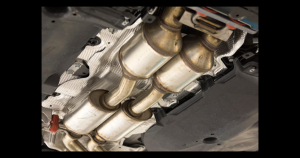 Your catalytic converter turns over 90 percent of the harmful compounds emitted from your engine into harmless gases. On rare occasions, your converter might stop functioning as it should, and will need to be repaired or replaced. Take a look at five clear signs that it’s time to visit your local Toyota dealer for a new converter.
Your catalytic converter turns over 90 percent of the harmful compounds emitted from your engine into harmless gases. On rare occasions, your converter might stop functioning as it should, and will need to be repaired or replaced. Take a look at five clear signs that it’s time to visit your local Toyota dealer for a new converter.
You Smell Rotten Eggs
Hydrogen sulfide has a distinctive and unpleasant smell, similar to that of rotten eggs, and is one of the pollutants emitted by your car’s engine. A healthy converter turns this stinky gas into sulfur dioxide, which is completely odorless.
So if you ever catch a whiff of rotten eggs while driving, trust your nose. It’s likely that your converter has stopped doing its job and hydrogen sulfide is pouring out of your exhaust, unconverted.
You Hear Rattling from Below
The converter sits beneath your car between the engine and the exhaust. Bumping over potholes or curbs can sometimes knock it loose or dent it. When this happens, the complex honeycomb mesh of metal inside the converter can break apart and become ineffective. This loosened mesh metal will start to rattle around noisily.
If the converter itself is loosened by an impact, it will also create a rattling sound while you’re on the road. If you hear rattling, have your converter checked right away. You might need a new one.
Your Acceleration Diminishes
A car engine needs a constant, steady flow of oxygen. If this airflow becomes hindered, the fuel-air mixture in the engine’s combustion chambers becomes unbalanced. This leads to sluggish acceleration, among other problems.
A clogged-up converter is one thing that can slow down this airflow as it stops the air from escaping smoothly. So if you’re pushing your foot on the pedal but not gaining speed as you should be, your converter might be to blame.
Your Gas Mileage Is Falling
When engine performance declines because of a clogged converter, your car struggles to compensate by burning more fuel for every mile that you drive. So if you notice you’re stopping for gas more often than before, you might need a new converter.
Your Check Engine Light Comes On
A modern Toyota has myriad computerized sensors throughout the vehicle. These monitors will detect the problems caused by a damaged or failing converter.
When the Check Engine light starts blinking on your dashboard, the issue might lie with your converter or something else altogether. But it’s unwise to ignore this warning light. Have a technician take a look right away.
How a Toyota Dealer Checks Your Converter
A technician at your local dealership will first connect to your vehicle’s onboard computers to run a diagnostic check. They’ll then use specialist tools to examine your converter. At the very start of the process, they’re likely to loosen the tailpipe connection or remove the oxygen sensor and run the engine. If the problematic symptom, such as poor acceleration improves, then they’ve identified the cat as the culprit.
To have your converter inspected or replaced today by experienced professionals, visit Priority Toyota of Chesapeake. We’re a trusted local dealership committed to providing each and every customer with the region’s very best service, whatever your vehicle needs might be.



